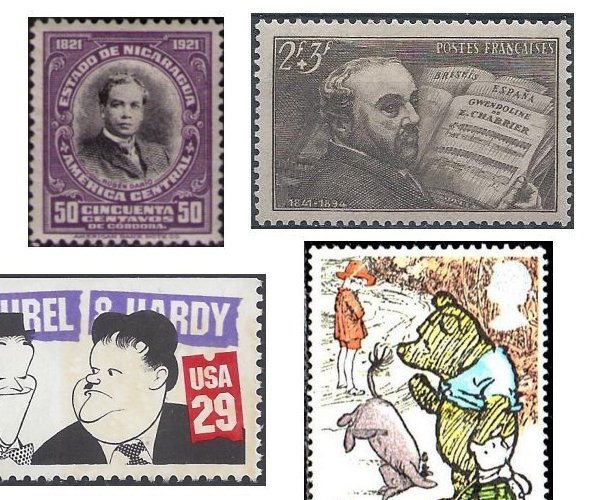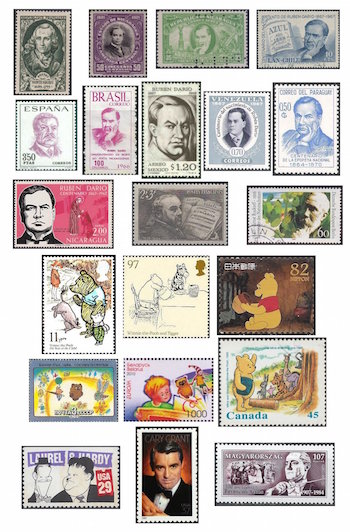The Arts on the Stamps of the World — January 18
An Arts Fuse regular feature: the arts on stamps of the world.

By Doug Briscoe
On this January 18 we celebrate the birthdays of Nicaraguan poet Rubén Darío, composers Emmanuel Chabrier and Ernst Rudorff, Winnie-the-Pooh creator A.A. Milne, actors Oliver Hardy and Cary Grant, and Hungarian conductor János Ferencsik, with a passing salute to Montesquieu, not an artist per se, but one of the great thinkers of the Age of Enlightenment.
We could, I think, justify including Montesquieu in our philatelic tributes to the arts as he first came to fame with his satirical Lettres persanes of 1721, a sort of proto-epistolary novel. But in any case his masterpiece, De l’Esprit des Lois (The Spirit of the Laws) of 1748, which had enormous influence on the political thought of the day and of posterity, earns him an honorary mention. Charles-Louis de Secondat, Baron de La Brède et de Montesquieu was born on 18 January 1689 and died on 10 February 1755.
This year marks the sesquicentennial of the birth of Félix Rubén García Sarmiento (1867 – February 6, 1916), commonly known as Rubén Darío, and I would expect a number of stamp issues to be forthcoming during the course of 2017. In the meantime we have a large number of earlier stamps to see. This international profusion is, I suppose, partly attributable to Darío’s remarkably peripatetic history, but is mainly due to his reputation as the fount of the Spanish-American literary movement known as modernismo and his pervasive influence on Spanish-language literature and journalism, with some referring to him as the “Prince of Castilian Letters”. Just six years after gaining notoriety as a “child poet” with pieces published in 1880 (age 13), Darío moved to Chile, and his subsequent journalistic career took him to Buenos Aires (1886, correspondent for La Nación), San Salvador (1888, director of the periodical La Unión), and Guatemala (1890). The second edition of his poetry and prose collection Azul made him famous. Off to Costa Rica in 1891, he left his family there the following year to return to Guatemala and Nicaragua, then was appointed to the Nicaraguan delegation to Madrid for the 400th anniversary of Columbus’s expeditions. Then it was Paris, back to South America, on to Mallorca and, on the outbreak of World War I, the United States, where he read his poems at Columbia University. With all this travel it is perhaps remarkable that he died in his native Nicaragua, his health ruined by alcoholism. Just a few years later (1921) he was honored on a stamp, one of the earliest stamps in the world to memorialize a writer. Of the later stamps, shown here are examples from Chile, Brazil, Venezuela, Paraguay, Mexico, and Spain.
Emmanuel Chabrier (1841 – September 13, 1894) has been honored with a single stamp, a French one from 1942. His best known work is the delightful short orchestral piece “España”, but he is by no means dismissed as a composer of pleasing trifles—he was greatly admired by Mahler, Ravel, Richard Strauss, and Stravinsky, and Poulenc even wrote a biography of him. The score of “España” is open before him in the stamp design, along with scores to his operas Gwendoline and Briseïs.
Ernst Friedrich Karl Rudorff (1840 – December 31, 1916) was born in Berlin and studied under Moscheles, Rietz, and Reinecke, among others. He himself taught piano at the Cologne Conservatory and the Berlin Hochschule. Leo Blech, Leopold Godowsky, and Carl Schuricht were some of his students. As a composer he left three symphonies, three overtures, other orchestral and vocal works, a string sextet, and many songs, as well as an orchestration of Schubert’s great Fantasy in F minor for piano duet. He founded a Bach-Verein Köln in 1867 (not to be confused with a more recent organization of the same name founded in 1931).

Alan Alexander Milne (1882 – 31 January 1956) was the creator of Winnie-the-Pooh, beloved around the world, as can be seen on many postage stamps of many countries (a lot of the stamps make use of Disney images, Disney’s cartoons being themselves a hugely popular subject for stamps internationally). Besides British ones, I show stamps from Canada, Japan, Belarus, and even the USSR. The English author wrote much more than the Pooh stories: stage plays, mystery novels, many screenplays, mostly in the 1920s, etc. Having served in the army in World War I, Milne wrote a denunciation of war titled Peace with Honour in 1934, but altered his position somewhat a few years later with War with Honour (1940), going on to serve as a captain of the British Home Guard in World War II.
Given the number of subjects today, I’ll pay short shrift to two very famous British-born stars of the silver screen, Oliver Hardy (born Norvell Hardy; 1892 – August 7, 1957), who appeared with Stan Laurel in 107 shorts, features, and cameos, and Cary Grant (born Archibald Alexander Leach; 1904 – November 29, 1986), who, I kid u not, took my sister out to dinner a couple of times (she was a New York model in the 60s).
János Ferencsik (YAH-nosh FEHR-en-tchik; 1907 – 12 June 1984) was an important Hungarian conductor. He was a friend of Bartók and Kodály and served as General Music Director of the Budapest Opera, Principal Conductor of the Hungarian National Philharmonic and Conductor Chairman of the Budapest Philharmonic. He made frequent appearances with Vienna orchestras and the Vienna State Opera, where he was briefly principal guest conductor. His funeral monument is a strikingly unusual Orpheus. In 2007, Hungary honored him with a centenary stamp.
A graduate of the University of Massachusetts with a B.A. in English, Doug Briscoe worked in Boston classical music radio, at WCRB, WGBH, and WBUR, for about 25 years, beginning in 1977. He has the curious distinction of having succeeded Robert J. Lurtsema twice, first as host of WGBH’s weekday morning classical music program in 1993, then as host of the weekend program when Robert J.’s health failed in 2000. Doug also wrote liner notes for several of the late Gunther Schuller’s GM Recordings releases as well as program notes for the Boston Classical Orchestra. For the past few years he’s been posting a Facebook “blog” of classical music on stamps of the world, which has now been expanded to encompass all the arts for The Arts Fuse.

